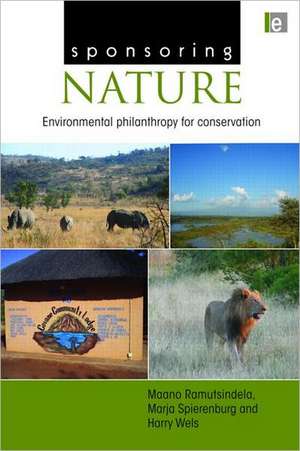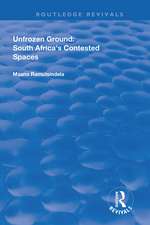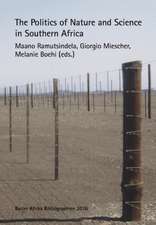Sponsoring Nature: Environmental Philanthropy for Conservation
Autor Maano Ramutsindela, Marja Spierenburg, Harry Welsen Limba Engleză Hardback – aug 2011
It has been argued that donor support is based on recipient's perceived expertise and needs, with no favouritism of flagship environmental organizations as recipients of donor funds. A counterview holds that the private sector prefers to fund mainstream ENGOs for environmental research and policy reforms congenial to industrial capital. The authors show that the debate about these arguments, together with the empirical evidence on which they are based, may shed light on certain aspects of the nature of environmental philanthropy. The book evaluates practical examples of environmental philanthropy from Africa and elsewhere against philosophical questions about the material and geographical expressions of philanthropy, and the North-South connections among philanthropists and ENGOs and CBOs.
| Toate formatele și edițiile | Preț | Express |
|---|---|---|
| Paperback (1) | 449.41 lei 6-8 săpt. | |
| Taylor & Francis – 21 dec 2017 | 449.41 lei 6-8 săpt. | |
| Hardback (1) | 1004.34 lei 6-8 săpt. | |
| Taylor & Francis – aug 2011 | 1004.34 lei 6-8 săpt. |
Preț: 1004.34 lei
Preț vechi: 1224.80 lei
-18% Nou
Puncte Express: 1507
Preț estimativ în valută:
192.19€ • 198.57$ • 159.87£
192.19€ • 198.57$ • 159.87£
Carte tipărită la comandă
Livrare economică 20 martie-03 aprilie
Preluare comenzi: 021 569.72.76
Specificații
ISBN-13: 9781844079049
ISBN-10: 184407904X
Pagini: 220
Ilustrații: black & white illustrations
Dimensiuni: 156 x 234 x 23 mm
Greutate: 0.57 kg
Ediția:1
Editura: Taylor & Francis
Colecția Routledge
Locul publicării:Oxford, United Kingdom
ISBN-10: 184407904X
Pagini: 220
Ilustrații: black & white illustrations
Dimensiuni: 156 x 234 x 23 mm
Greutate: 0.57 kg
Ediția:1
Editura: Taylor & Francis
Colecția Routledge
Locul publicării:Oxford, United Kingdom
Cuprins
Preface 1. Shades of Philanthropy 2. Environmental Philanthropy 3. The South-North Connections 4. Philanthropists, Capitalists and Environmental NGOs 5. Framing Environmental Threats: Implications for Funding 6. The Global Environment Facility: Financing Conservation in the Global South 7. Mapping Environmental Philanthropy in Africa 8. Rising to Local Challenges: Grassroots Conservation Initiatives 9. State-sponsored Community Conservation 10. Power Relations, Priorities and the Future of Environmental Philanthropy. Selected Further Reading. Index
Notă biografică
Maano Ramutsindela is Associate Professor in the Department of Environmental and Geographical Science at the University of Cape Town; Hubert H Humphrey Visiting Professor of International Studies at Macalester College (2010); and Mandela Mellon Fellow of W.E.B. Du Bois Institute, Harvard (2011) . He is currently researching meanings of the border in transborder environments; green imperialism in transfrontier conservation in Southern and Eastern Africa; and the ways in which regions and environmental agendas constitute new environmental regionalisms in different parts of the world. His recent publications include Parks and People in Postcolonial Societies: Experiences in Southern Africa (Kluwer/Springer, 2004) and Transfrontier Conservation in Africa: At the Confluence of Capital, Politics and Nature (CABI, 2007). He is the Editor of the South African Geographical Journal and Associate Editor of GeoJournal. Marja Spierenburg is Associate Professor/Senior Lecturer at the VU University Amsterdam in the Netherlands, in the Department of Culture, Organisation and Management. She is currently involved in several research projects focusing on the role of the private (for-profit and non-profit) sector in nature conservation as well as in land reforms in Southern Africa. Her research investigates the negotiations between the different parties but also within the different partner organisations concerning the meaning of the concepts of development and conservation. It also addresses the impacts of the growing importance of public-private partnerships in conservation on the land rights of local communities and the latter's possibilities to participate in the management of and benefit from conservation and land reform projects. Marja Spierenburg's earlier books and articles include 'Conservative philanthropists, royalty and business elites in nature conservation in southern Africa', co-authored with Harry Wels, published in 'Antipode' in 2010, 'Strangers, Spirits and Land Reforms, Conflicts about Land in Dande, northern Zimbabwe' (Brill 2004) and, together with Sandra Evers and Harry Wels 'Competing Jurisdictions. Settling Land Claims in Africa' (Brill 2005).Harry Wels is Associate Professor/Senior Lecturer at the VU University Amsterdam, at the Athena Institute, Faculty of Earth and Life Sciences. He has worked on issues of private wildlife conservation and community relations in Zimbabwe and South Africa. He has been working on structures of organisational cooperation within the Great Limpopo Transfrontier Conservation Area in southern Africa. Currently he is developing a transdisciplinary and transspecies research programme on traumatic stress related behaviour in humans and non-human animals in southern Africa. His earlier books and articles include: Private wildlife conservation in Zimbabwe. Joint ventures and reciprocity, (Brill 2003) and, together with Marja Spierenburg (2006) 'Securing space': mapping and fencing in transfrontier conservation in southern Africa in Space and Culture.
Recenzii
'Environmental philanthropy is growing and changing. This book provides an important and very useful insight into its history, how it works, and where it might go in the future'. – George Holmes, School of Earth and Environment, University of Leeds, UK
'A rich and varied, indeed eclectic, account of the history, thinking, practice and personalities across a broad swathe of environmental philanthropy. Philanthropy is becoming ever more important and we need more explorations like this to understand the changes it produces, and stymies.' – Daniel Brockington, Reader in Environment and Development, University of Manchester, UK
'Sponsoring Nature presents a multitude of case studies and argues that environmental philanthropy can do both good and harm to the environment and well-being in, often complex, unanticipated and unintended ways ... [this book] is an important first step in thinking through the compex pathways and networks through which conservation finance needs to be understood' – Charlene Watson, Environment and Planning C
'A rich and varied, indeed eclectic, account of the history, thinking, practice and personalities across a broad swathe of environmental philanthropy. Philanthropy is becoming ever more important and we need more explorations like this to understand the changes it produces, and stymies.' – Daniel Brockington, Reader in Environment and Development, University of Manchester, UK
'Sponsoring Nature presents a multitude of case studies and argues that environmental philanthropy can do both good and harm to the environment and well-being in, often complex, unanticipated and unintended ways ... [this book] is an important first step in thinking through the compex pathways and networks through which conservation finance needs to be understood' – Charlene Watson, Environment and Planning C



















